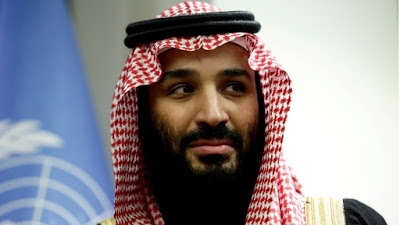The US mainstream media is ignoring the Israel-Saudi Arabia de facto alliance
 |
| James North – October 16, 2018 |
Over the past week or so, Saudi Arabia has gotten more U.S. mainstream media coverage than at any time in decades.
But conspicuously missing has been any reporting on the kingdom’s growing friendship with Israel — a de facto alliance that may help explain why Crown Prince Mohammed bin Salman thought he could get away with ordering the murder of the dissident journalist, Jamal Khashoggi.
Madawi Al-Rasheed is a Saudi Arabian woman professor, presently at King’s College London, who has written or edited more than 13 books on her home nation. Particularly valuable is her recently edited (2018) collection about the kingdom’s new leadership, entitled Salman’s Legacy: The Dilemmas of a New Era in Saudi Arabia.
In that book, she is clear about the growing Saudi rapprochement with Israel. She writes that the Crown Prince “has continued to clandestinely cooperate with Israel on security and economic matters,” adding
In July 2016 a delegation of Saudi academics and businessmen visited Israel with a view to establishing discreet relations, aimed at strengthening Saudi Arabia’s military capabilities and enlisting Israel in any armed confrontation with Iran.
Further evidence of this Saudi-Israel connection is the absence of any official criticism from Tel Aviv about the assassination of Jamal Khashoggi. Once upon a time, the Israeli government promptly denounced any crimes anywhere in the Arab or Muslim world. But the recent Twitter feeds of Prime Minister Benjamin Netanyahu and former ambassador to the U.S. Michael Oren include not a word about the murder of Khashoggi.
The mainstream U.S. press is also ignoring this Saudi-Israel connection. Here’s just one example: in the Atlantic, Aaron David Miller analyzed the U.S.-Saudi relationship at some length but he only mentioned Israel in passing — an odd omission for a Professional Peace Processor like himself who knows Israel inside out.
By contrast, the British media had started to report on the budding Israel-Saudi Arabia relationship. In November 2017, the BBC said that “to all intents and purposes, Saudi Arabia and Israel are de facto allies against Iran’s rising influence in the region.” The BBC report cited an interview with the UK-based Saudi newspaper Elaph, in which Israel’s Chief of Staff, General Gadi Eisenkot, revealed that “Israel was ready to exchange intelligence with the Saudis in order to confront Iran.”
Nearly a year ago, this site had suggested that “an alliance of Saudi Arabia and Benjamin Netanyahu, urged on privately by the Trump administration, is deliberately moving toward starting a much wider ‘New War in the Mideast.’” Our source was the distinguished veteran journalist Béchir Ben Yahmed, the founder and still editor of the respected French-language Jeune Afrique (Young Africa), who warned that the Saudi-Netanyahu partnership might aim at Iran’s ally, the Hezbollah political/military movement in Lebanon.
The de facto Israel-Saudi Arabia alliance is another nail in the coffin of the ludicrous Clash of Civilizations theory. Samuel Huntington, one of the theory’s two main advocates, famously wrote that “Islam has bloody borders.” As Islamic Saudi Arabia and Jewish/Western Israel collaborate against Islamic Hezbollah, where is this “fault line”?
Of course, even if Israel had never existed, the United States (and Europe) would support Saudi Arabia. Fracking in the U.S. may have reduced dependence on Saudi oil exports, but the kingdom could still trigger a world recession if it wanted to. And the shameful spectacle of all the U.S. businesses that had planned to participate in the upcoming “Future Investment Initiative” in the Saudi capital, Riyadh, (the New York Times was a co-sponsor) proves that not just weapons manufacturers planned to keep making money in the repressive medieval desert kingdom.
Still, the Israel-Saudi connection surely strengthens the U.S. zeal to protect and excuse Saudi crimes. When will the U.S. mainstream media start reporting on it?


